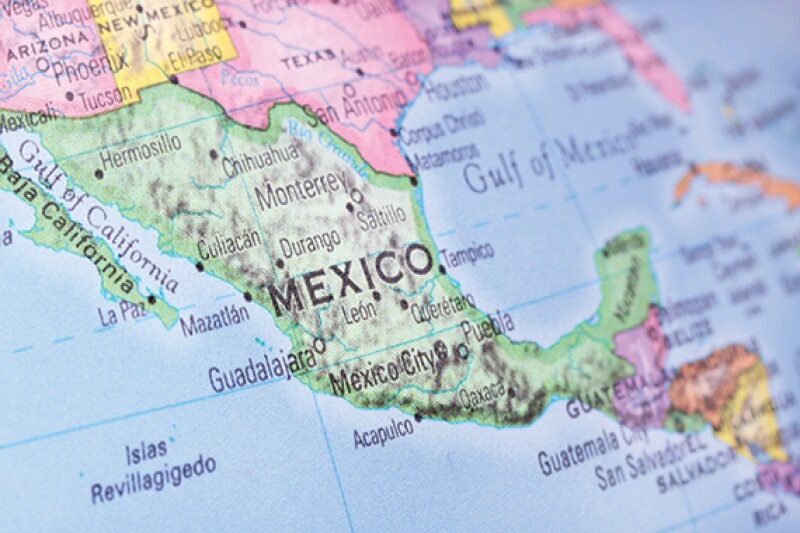For some time now, economic and social distortions have become commonplace in an area that stretches for nearly 3,200 kilometres between the Pacific Ocean and Gulf of Mexico.
More recently, particular circumstances such as an intensification of Mexico's drug war, and a rise in the number of immigrants from Central America and the Caribbean, among others, have exacerbated tensions in a region now imminently requiring action from the Mexican government.
As a consequence of these conditions, Mexico's Official Federal Gazette published an executive order on December 31 2018, entitled Tax Incentive Decree for the Northern Border Region. The decree sets forth a series of measures for the next two years that seeks to strengthen the economy for taxpayers residing in the northern border, while seeking to retain local consumers, stimulate and attract investment, while fostering productivity and contributing to the creation of jobs. The foremost reasons for granting such benefits include:
The fallout caused by high levels of violence and organised criminal activity in the area;
The concentration of the manufacturing industry;
The area's vicinity to the US border; and
The use of the US dollar as a currency for exchange in the region.
In general, the aforementioned measures are mainly comprised of two different incentives that will not be considered as taxable income and will provide a reduction in applicable income and value-added tax (VAT) in the northern border region (NBR).
Income tax incentive
Firstly, the executive order lays out the municipalities of border states that comprise the so-called NBR where the incentives have been in effect since January 1 2019. The municipalities are divided as shown in Table 1.
Table 1 |
|||||
Baja California |
Sonora |
Chihuahua |
Coahuila |
Nuevo León |
Tamaulipas |
Ensenada |
San Luis Río Colorado |
Janos |
Ocampo |
Anáhuac |
Nuevo Laredo |
Playas de Rosarito |
Puerto Peñasco |
Ascensión |
Acuña |
Guerrero |
|
Tijuana |
General Plutarco Elías Calles |
Juárez |
Zaragoza |
Mier |
|
Tecate |
Caborca |
Praxedis G. Guerrero |
Jiménez |
Miguel Alemán |
|
Mexicali |
Altar |
Guadalupe |
Piedras Negras |
Camargo |
|
Sáric |
Coyame del Sotol |
Nava |
Gustavo Díaz Ordaz |
||
Nogales |
Ojinaga |
Guerrero |
Reynosa |
||
Santa Cruz |
Manuel Benavides |
Hidalgo |
Río Bravo |
||
Cananea |
Valle Hermoso |
||||
Naco |
Matamoros |
||||
Agua Prieta |
|||||
Requirements
Taxpayers entitled to the tax incentives listed in the decree must either be individuals that conduct business activities, or be legal entities that reside in Mexico for tax purposes. The latter includes non-residents with a permanent establishment in Mexico, but are subject to certain requirements such as "exclusively" obtaining income from the NBR.
The income tax incentive consists of a credit system that will reduce the payable tax by a third, and that will be applicable against both advanced payments made during the year and the annual tax return. Furthermore, such a tax credit will be applicable proportionally to the share of the income obtained within the NBR, with respect to the total income obtained during the corresponding tax year. However, this excludes income derived from digital commerce and intangible goods. The creditable proportion for a taxable year will be calculated accordingly:
Proportion = |
Total income from NBR (TINBR) |
Total income from previous tax year |
Additionally, taxpayers must prove that their tax domicile has been located in the NBR for at least 18 months before claiming the benefits listed in the executive order. This can be done by registering for authorisation before the Mexican Tax Administration Service (TAS). According to present rules, the filing must occur before March 31 of the specific tax year.
A decision must then be reached by the tax authorities within a month following the date the authorisation request was filed (authorised taxpayers will be included in the registry of beneficiaries of the NBR incentive). If no answer is obtained from the TAS, the request will be deemed as denied. If authorisation is granted, its validity will last for a year and may be renewed for the subsequent year.
Although the decree expressly states the need to be tax domiciled within the NBR, it is possible for non-compliant taxpayers that have branches, agencies and other establishments in the region to apply the benefits of the decree. According to rules that have been published at the time this article was written, the proportion of income obtained within the NBR would still have to be complied. Income from the NBR must represent at least 90% of the taxpayer's total income.
If it is the intention of the decree to benefit transactions occurring within the NBR, it would be desirable for rules to be published regarding how taxpayers who are non-compliant with the requirement (of obtaining 90% of their total income from the NBR) would alternatively comply with such a threshold at the following levels: NBR branches, agencies, or other establishments. This is in contrast to relying on the overall basis of the taxpayer.
The above would illustrate how taxpayers who are non-NBR domiciled (but have NBR branches, agencies or establishments) could benefit from the decree proportionately on income effectively realised by such establishments.
Exceptions
Executive power in the decree has introduced several limitations to avoid tax-planning abuses by the taxpayers, and to counter overall losses in tax revenues for the country.
Taxpayers not entitled to the benefits include: banks, insurance and bond agencies; leasing entities; credit unions; general deposit warehouse; taxpayers subject to the optional regime for groups of entities (Mexican deferral, consolidation-like regime); taxpayers under the agricultural, livestock, forestry and fishing activities regime; taxpayers that render independent professional services or who carry out activities through FIBRAS (Mexican real estate investment trusts); business activities through fideicomisos (Mexican trusts); taxpayers under the shelter maquila regime (foreseen by the Mexican Income Tax Law and state productive enterprises); as well as contractors according to the Hydrocarbons Law.
Taxpayers that have presumably carried out fraudulent transactions and those who have been subject to an audit during the past five years (and have not corrected their situation) are also excluded. Authorisations may also be revoked by the tax authorities.
Another important point to emphasise is that the applicability of the income tax credit is subject to no other tax incentive being utilised by the taxpayer. The decree further notes that the benefits of the tax credit will not give way to any rights to request tax refunds, or to apply any type of offsets.

|
Mexico’s northern border region (NBR) has become a focal point for national policymakers |
Compliance programme
Authorised taxpayers will have to cooperate with the TAS by participating in a 'real-time verification programme' according to the administrative rules that have been issued. Cooperation consists of filing several documents listed in the administrative rules published for such purposes within the 30 days following each semester of the relevant year.
For certain taxpayers, cooperation in the real-time verification programme can be carried out electronically, or directly by the tax authorities in the taxpayer's domicile, branch, agency or other establishment.
Value-added tax incentive
The executive order sets forth an additional tax incentive for taxpayers that are either individuals or legal entities who sell goods, render independent services, or obtain taxable rental income from establishments located within the NBR that consist of a tax reduction of 50% of the value-added tax (VAT) ordinarily in effect.
For administrative simplification purposes, this tax expenditure allows taxpayers to apply the credit directly on invoices issued with VAT and effectively reduced the ordinary 16% rate to 8%.
Requirements
The beneficiaries of this tax incentive will be required to comply with certain measures provided in TAS regulations issued for purposes of the decree. Nevertheless, the executive order establishes that taxpayers claiming credit must file a notice before the tax authorities by February 7 2019. Also, the material delivery of the goods or services rendered must take place in the NBR.
Exceptions
A certain number of the limitations provided by the decree (for purposes of the income tax incentive) are applicable for VAT credit as well. Taxpayers presumably involved in fraudulent transactions as well as those that have been assessed with a tax deficiency shall not be able to claim the credit. Furthermore, that credit is not available for the sale of real estate properties or intangible assets, nor for the supply of digital content such as audio and video by means of download or "temporary reception".
When it ultimately comes to the requirements and exceptions of both income tax and VAT credits, a case-by-case analysis must be conducted in light of the TAS regulations in order to determine the applicability of such incentives.
For Mexican tax purposes, the electronic invoice is consequentially of the utmost importance to recognise the tax effects from transactions carried out by taxpayers. It is important to verify the application notice following the filing and to ensure that systems have been updated in order to issue invoices reflecting the 8% rate for qualified transactions.
Final remarks
As part of the new government's campaign commitment to fighting these challenges and promoting the NBR's economy, the decree is expected to have a beneficial impact with long-term visible results. However, current rules have only targeted a small portion of potential beneficiaries of such an incentive, particularly for income tax purposes.
At the decree's early stage of implementation, tangible opportunity areas should be addressed in order to clarify aspects that may limit its application and from achieving the favourable impact on the NBR's economy. Additionally, clear regulations are advisable in the near future to achieve this goal.
Roberto Padilla Ordaz |
|
|---|---|

|
Chevez, Ruiz, Zamarripa y Cia Tel: +52 (55) 5261 5652 Roberto Padilla Ordaz is a partner in Chevez, Ruiz, Zamarripa. He is specialised in federal taxation matters in Mexico, focusing on M&A, financial institutions, investments structures and international taxation. He obtained a bachelor's degree in public accounting and financial strategy from the Instituto Tecnológico Autónomo de México (ITAM) in Mexico City, where he took a post-graduate course in corporate advisory. He obtained his master's degree in tax law from Universidad Panamericana (UP) in Mexico City. He is a member of the Mexican Institute of Public Accountants (IMCP), of the College of Chartered Accountants in Mexico (CCPM) and of the Mexican IFA Group participating in the Young IFA Network (YIN). Roberto has participated, among other publications on taxation topics, as co-author of the Mexico chapter of the book The Private Wealth & Private Client Review, edited by Law Business Research. |
Jorge Ramón Galland Ríos |
|
|---|---|

|
Chevez, Ruiz, Zamarripa y Cia Tel: +52 (55) 5257 7025 Jorge Ramón Galland Ríos is an associate in Chevez, Ruiz, Zamarripa. He specialises in federal taxation matters in Mexico, focusing on cross-border transactions and international taxation. Jorge Ramón is a lawyer from the Universidad Iberoamericana (UIA) in Mexico City. He has taken a post-graduate course in taxation at the Instituto Tecnológico Autónomo de México (ITAM) and another in negotiation, mediation and conflict resolution at the Centro de Investigación y Docencia Económicas (CIDE) in Mexico City. He obtained a tax specialist degree from the Universidad Nacional Autónoma de México (UNAM) in Mexico City. He holds an LLM in taxation and an international taxation certificate from Georgetown University in Washington DC. He has participated in the elaboration of several publications on taxation topics. |












